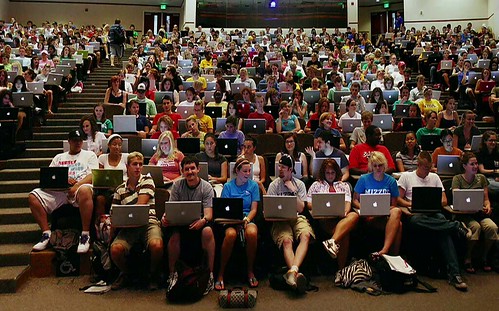Tuesday, December 4, 2012
Shifting from "Digital Natives" to "Digital Citizens"
I just read this blog post from Education Week...and I agree. I'm quick to label my students as "Digital Natives." This term comes from a now-classic 2001 article by Marc Prensky. I've been using the term digital natives to describe my students for at least the past seven or eight years since I encountered Prensky's piece, because it is a helpful metaphor.
Even more helpful is his idea of digital immigrants. In my previous role as Technology Coordinator, I sometimes thought of myself as a translator--perhaps an "immigrant" by age, but one well-integrated into the culture and with very little lingering accent. Interesting to see how some teachers--like other immigrants--can cling to the old ways and long for the old country. Their accent can be very, very pronounced.
I worry a little, as I get older that this may happen to me as well.
That's why I like the idea in this piece: all of us, students and teachers alike, are digital citizens. All of us--regardless of our level of comfort working with technology for teaching and learning--have a responsibility as citizens in this culture, whether native or immigrant. And for teachers (even immigrant teachers), we have a responsibility to teach students to be thoughtful, productive, law-abiding, constructive, self-aware citizens.
At my last school, as I served as Technology Coordinator, I took very seriously the role of teaching students to become good digital citizens. From my predecessors I had inherited a great project: the Internet Driver's License. Clever analogy, but one that the students got excited about. And the basic idea is sound, I think. They need to learn the "rules of the road": How to be safe, how to be responsible, how to play well with others online.
Just because they have a natural facility with the technology does not mean they automatically know how to be wise. And that's the point of digital citizenship, right?
Subscribe to:
Post Comments (Atom)

Interesting analogy. One that I can actually already relate to. I feel pretty confident in saying that I'm probably the most technologically-inclined person in almost any room (let alone a classroom). Teacher's computer weirds out? People always yell "hey Joseph - fix it!," even if it's something extremely basic. Someone doesn't know how to use, install, or troubleshoot something? They ask me or ask someone else to ask me. I work for tech services for crying out loud! ;)
ReplyDeleteAs someone who wants to be an educator when I grow up, I feel it necessary to cling to my adeptness. I look back just to when *I* was in elementary school and already, everything is different. We didn't have iPads, laptops, smartboards, or even projectors! We oo'ed and ahh'ed at a transparency projector!
Knowing that everything is changing so quickly is insanely demanding on anyone like me. You think it's easy to keep up and informed with all the new and next innovations? Hahaha NOPE. Google Reader will throw about 200 articles a day for me to read...
In in pursuit of wanting to stay at the forefront of technology comes the realization that everything you tire and work so hard to learn is going to be complete obsolete in 5-10 years. That fact is not exactly harmonizing, but it's just the plain and simple truth. I see teachers (*cough* and professors) all the time caught up and lost in their technology when it's imposed on them.
Goodness knows that the students of the future are going to be technologically proficient, and because of that, I think that education is slowly but surely becoming a profession that will absolutely demand that proficiency from everyone. For someone like me, that's actually really encouraging, because I know I'm going to keep up with the news, and I feel like that gives me an "ace in the hole" when looking for a job as a teacher!
Here's a totally separate thought: I think that only people born in the last 20 or 30 years were born into a time where technology is changing fast that they see that what they learned wont matter in 10 years. While there are certainly tons exceptions either way, I think our parents and grandparents might have assumed that because technology moved so slowly (until about the 80's), that they would never have to learn anything else, so they didn't.
I'll be honest and say that I have no clue how to conclude this whole post, so I'll just end by saying that the cookies from 55th Ave. are really good. :)
Your tech-savviness is something to celebrate! It'll make you more marketable as a teacher for sure. (I dislike the term "marketable" when it comes to education...as if a teacher is a commodity to be bought and sold...ugh.)
DeleteI sometimes thing we have our standards set *far* to low for an expected level of technological literacy for teachers. But...I say that as a techie myself...so recognize my bias here.
Thanks for taking the time to reply with your thoughts, Joseph. I think you and I are of one mind. This is a very exciting time to be in education! I think there is a possibility of a real pedagogical shift...one that is probably already underway, though not everywhere, and not progressing evenly. I *do* think that current and evolving technology has the potential to change the way learning happens, but I also think that many (not all, but many) teachers fear that change. This is undiscovered territory! And the unfamiliar can be scary if you don't approach it with an enthusiasm to explore and learn on the way.
ReplyDeleteMy thinking is continuing to develop on this...it'll be interesting to see where school culture is in another decade. Maybe I'll look back at this blog then and chuckle at how wrong I was...